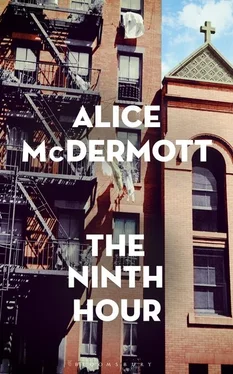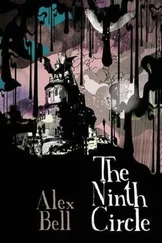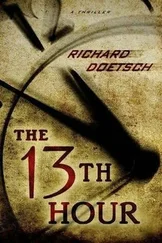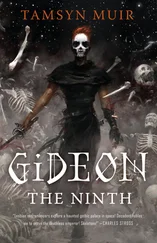From the bare living room, Sally heard Sister Lucy say, “One of the Sisters will be back to give you your lunch today. Mr. Costello has some business in the city. He left a note. He’ll be home by dinnertime.”
There was a silence, and then, slowly, Sally could hear that the woman was crying again. “I’m frightened when he’s gone,” she said, weeping. “I’m afraid when I’m alone.” She cried gently for a while, childish and heartbroken. And then, suddenly, her voice snapped back into peevishness. “Do you hear me, Sister?” she called out. “I said I’m afraid.”
“There’s nothing to fear, Mrs. Costello,” Sister Lucy said coolly. “Say your prayers to pass the time.”
And then there was a thump, as of something dropped or thrown. “I have a pain,” Mrs. Costello cried out. “Do you hear me?”
Sister Lucy’s voice broke like thunder. “Behave yourself, woman,” she said. “We’ll have no more of that.” And then, hissing it: “Say your prayers. Thank God for the life He’s given you. Thank Him for your good husband. You’ll get no other.”
There was a fraught silence. Into it, Sister Lucy muttered, “You might have broken this lamp.”
When Mrs. Costello spoke again, her voice was subdued, conspiratorial. “Look at this bun, Sister,” she said. “It’s a rat’s nest. Take it out, won’t you? Before you go.”
From the living room where she stood, Sally could hear the hairpins going back into the dish.
She walked into the kitchen to put away the dustpan and the broom. Her own eyes were smarting with what she knew were foolish tears.
When she returned to the living room, she could hear Sister Lucy saying, “I would defer to your husband’s good judgment. He’ll be back for dinner, as always.” And then she was walking out of the bedroom, rolling down her sleeves. There was a brush of brown blood on her apron. When she saw Sally, she paused abruptly, as if she’d forgotten her, and then her expression changed again. For a moment she looked at the girl with narrowed eyes, as if she recognized in her a liar or a thief. And then, slowly, a purple hue rose into the nun’s stony face. She ducked her head, slipped off her apron, folded it into her bag, and then reached for her cloak. She told Sally to go fetch the bag of laundry.
As they were about to leave, Mrs. Costello called out again. “I’m afraid,” she said. “Please don’t leave me.”
“Say your prayers,” Sister Lucy called back.
“I’m in pain,” Mrs. Costello said, but with diminished insistence.
“You’re fine,” Sister Lucy said, closing the door, locking it with her key.
“I’m afraid,” Mrs. Costello called again.
Following Sister Lucy down the stairs, Sally asked, “Will she be all right?”
Sister said, without turning, “Of course.”
Faintly, she could hear Mrs. Costello’s voice still complaining. “Is it her leg that’s hurting her? The short one?”
“That’s an imaginary pain,” Sister Lucy said. “It isn’t real.”
Sally said, “But if she feels it.”
Sister Lucy said, “She wants company, is all. She doesn’t like to be alone.”
“Maybe we should stay.”
They had reached the vestibule. Sister Lucy was sailing out the door.
Without turning, she said, “There are others with greater need.”
Out on the sidewalk, in the bustling light, Sally paused. She was aware of her white nurse’s veil, the glances of passersby. Sister Lucy was forging ahead. Sally had to call “Sister” twice to get her to turn. Sister Lucy stood for a moment with her satchel in one hand, a man’s watch on a black strap in the other. She thrust out her jaw, a formidable jaw above her white wimple. A question, an impatient one, crossed her masculine face. Slowly, Sally walked to meet her. She would speak up.
Two women passing said, “Good morning, Sisters.” A man touched his hat. “Sisters.” Sister Lucy nodded to the greetings.
“The poor woman,” Sally said. “An imaginary pain is still a pain, isn’t it, Sister?”
Sister Lucy said, “Don’t be proud,” with the swiftness of a slap.
She raised her crooked hand. “Suffering,” she said, “does not disguise a true nature. It only lays it bare.” Inside her bonnet, her eyes were narrowed. “Any woman who wants an excuse to take to her bed will surely find one.” She paused. She seemed to consider whether she should continue, and then, with the slightest shrug, continued, leaning so close to Sally that the starched edge of her bonnet nearly touched the girl’s cheek. “There are women who marry with no idea of what marriage entails,” she said. “Some of them suffer for it. Babies coming every year. Others impose the suffering on their men.” She stepped back as if to see if Sally understood. “If the dog that bit her had been drowned as a pup, still Mrs. Costello would have found an excuse. There’s a young woman on Baltic with a withered arm and six children.” She raised her eyebrows, which were flecked with gray. “A woman doesn’t need two feet to give her husband a child,” she said.
Then Sister Lucy turned on her heel, stashing the watch into her pocket. “I’m going in here,” she said, indicating another row house, another chipped stoop and battered door. “I’ll be with Mrs. Gremelli in the front room. She needs her dressing changed. Catch up with me there.”
Sally stood for a moment, all uncertain. Sister Lucy clucked her tongue and turned her gnarled finger to the laundry bag in the girl’s hand.
“Take those soiled bedclothes to your mother,” she said with exasperated patience. “Then hurry back.” Adding, as the girl turned away, “And keep your eyes off yourself if you possibly can.”
* * *
THIS MUCH BECAME CLEAR TO SALLY over the course of the next week: Sister Lucy lived with a small, tight knot of fury at the center of her chest.
It had formed itself—a fist clenching—when her mother died of peritonitis, caused by a burst appendix.
Sister Illuminata, Sally learned, was not the only one tempted to tell stories of her time in the world.
Sister Lucy’s mother had died of peritonitis brought on by a burst appendix when Sister Lucy was seven years old. Appendicitis, Sister Lucy said, is indicated by a terrible pain in the lower right abdomen, fever, vomiting. She told Sally: Waste no time getting the doctor in.
Sister Lucy said the appendix itself is useless. They were waiting for the trolley together. Sister Lucy did not believe in wasted time. “Why God put it there is a mystery,” Sister Lucy said.
The peritoneum, Sister Lucy said, is a membrane that covers the organs in the abdomen like a piece of fine silk. “Our Creator is fanciful, perhaps,” Sister Lucy said, not amused.
For three days Sister Lucy, seven years old, had run, sleepless and terrified, between the kitchen and the sickroom, bearing the wide bowl, empty and then filled, filled and then empty. Filled with a bitter fluid that grew thinner and darker as the days progressed, that smelled of salty bile, and then of blood. The terrible retching. The blackening of her mother’s skin.
It is a loss like no other, Sister Lucy said.
She said, Life itself is a bleak prospect to a motherless child.
She was seven years old.
In these matters, Sister Lucy said again—“Are you listening to me?”—when there’s pain in the abdomen, fever, vomiting, never hesitate getting the doctor in. “Sister St. Saviour, God rest her soul—your namesake”—Sister Lucy said—“knew how to put the fear of God into any physician who was dismissive of the poor.” They were negotiating the reeking hallways of another tenement house. “I’ll give her credit for that much,” Sister Lucy said unhappily, a little breathless.
Читать дальше










